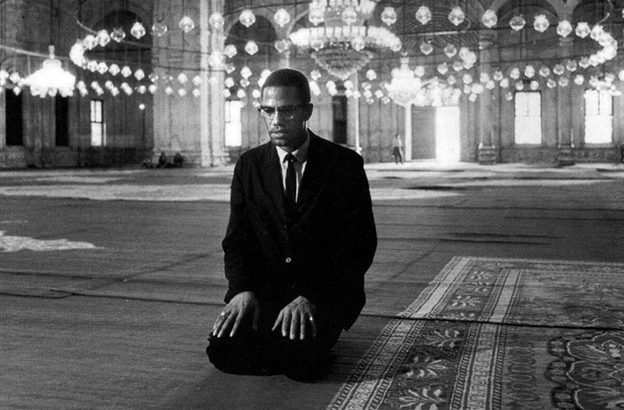
Malcolm X – A Reflection by Shaykh Jibreel Speight
February 22, 2022
The United States of America has many commemorations, including race and ethnicity, gender, people, and events. I want to ask you a question, but I would like to paint the scenario first.
At one time, a man lived in a racist era. Hostility was the norm. His parents, however, fought against racism. Unfortunately, members of a terrorist group, the Klu Klux Klan, killed his father, and his mother went into a mental institution, dying there. Eventually, this man became a criminal, stealing and using drugs. He served time in prison, allowing his situation to dictate his behavior until he learned of a different way. He began the transformation process, rejected drug use, and became “addicted to learning,” by reading the dictionary and practically every book in the prison library.
He joined the Nation of Islam, a Black nationalist organization that taught responsibility, accountability, courage, self-determination, truth, discipline, morality, proper diet, self-defense, and other positive things. He adored its leader and became its national spokesman. Unfortunately, he obtained controversial information challenging his loyalty to its leader, leading him to leave that organization.
He went to Mecca, one of Islam’s Holy Cities. During his international travel, he met with various leaders discussing the immorality and human rights violations of a particular people in the United States of America. He knew people were following him, and he knew people were invading his privacy, even listening to his intimate conversations with his wife. He was entirely aware that someone would probably kill him, but he did not fear death.
He had a Sudanese scholar teaching him orthodox Islam until his last breath. He was deeply concerned with the plight of his people, challenging them to shun their immorality. He wanted them to discard the various forms of poison harmful to their bodies, minds, and souls. He recognized the beauty of Islam and its potential in the United States for addressing race relations. According to this person, Islam does not use color to determine superiority or inferiority. It emphasizes belief and action articulating that belief.
He challenged the American political system, saying Democrats, Republicans, liberals, and conservatives were all evil for his people. He challenged the imperialistic nature of the United States and Europe to the point that he prepared a legal case against the United States for its human rights violations, presenting it to the United Nations. He was not successful because someone killed him.
Here are my questions.
First, who is this person?
Second, what can we learn from this person?
The answer to the first question is Al-Hajj Malik al-Shabazz, also known as Malcolm X.
Below are some possible answers to the second question.
First, his life was a journey filled with trials. He started in a challenging situation, struggled, and, ultimately, reached a higher level of religious devotion, articulating his dedication in the form of “servant leadership.”
Second, we can appreciate how his understanding of Islamic theology, ethics, and values dictated his worldview.
Last, he was a true morally conscience soldier, something I hope Chapman students, faculty, and staff deeply consider and aspire to be.
February 21 is the anniversary of Malcolm X’s death. Unfortunately, some look at his days before accepting orthodox Islam, consistently using words like “fiery” or “radical,” while conveniently, perhaps willingly, dismissing this vital part of traditional Islamic identity. Others do not acknowledge his profound, penetrating contribution to the Civil Rights Era. Others place some of his slogans on their social media platforms, doing nothing. Others look at Spike Lee’s inaccurate movie without reading the book!
I encourage you to take the time to learn a little about him. He is our brother, modern-day role model, and, arguably, one of the most influential figures in the world.
If you would like to learn more about brother Malcolm (God’s mercy be upon him), please take a look at this set of videos.